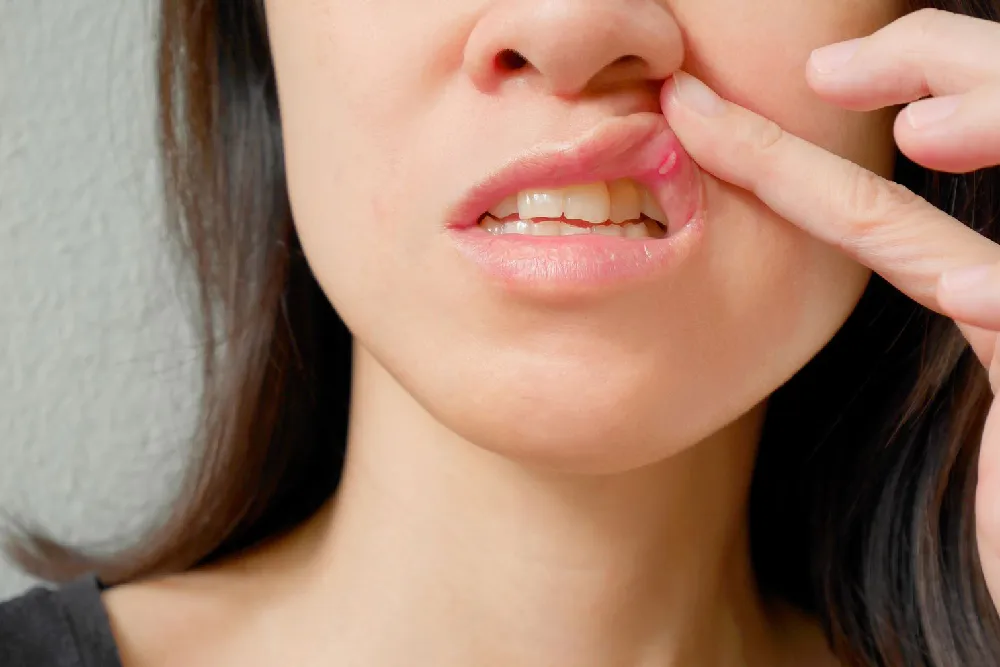

Did you know that over half of us will experience canker sores at some point? Though their exact cause is a bit of a mystery, factors like stress, food sensitivities, hormonal changes, or even a lack of vitamins can bring them on.
These sores can be quite sore, and it’s no surprise that many call an emergency dentist, worried they might be showing signs of oral cancer.
In this article, we will be showing you what an emergency dentist has to say about this. The blog will clear up the confusion, explaining what canker sores are and how they’re different from something as serious as oral cancer. Just keep reading!
Table of Contents


Also known as aphthous ulcers, canker sores, are small, shallow lesions that develop on the soft tissues inside your mouth or at the base of your gums.
Unlike cold sores, canker sores don’t appear on the surface of your lips and they’re not contagious. They can be quite painful, making eating, drinking, and even talking uncomfortable at times.
These ulcers usually appear as white or yellowish ovals with a red edge and can take anywhere from a week to a few weeks to heal completely.
While the exact cause of canker sores remains unknown, they are thought to be triggered by factors such as stress, accidental cheek bites, spicy or acidic foods, vitamin deficiencies, hormonal fluctuations, or underlying health conditions.
For most people, canker sores are a minor nuisance that will clear up on their own, but if you’re experiencing severe or persistent sores, it might be wise to consult a dental professional or doctor to rule out any underlying issues. Many people ring their emergency dentist when the sores refuse to go away.
Many people have confused canker sores with oral cancer. To help clear up the confusion, here are some key differences given by an emergency about the two conditions.
Canker sores are usually small, round or oval with a white or yellow centre and a red border. Oral cancer lesions, on the other hand, may appear as a growth or sore in the mouth that doesn’t go away and might have irregular edges. They can be red, white, or a mixture of both.
Canker sores typically heal on their own within one to two weeks, without leaving a scar. In contrast, an oral cancer sore or growth does not heal and persists for more than two weeks, often growing or changing over time.
Canker sores are often painful, especially when eating, drinking, or speaking. Oral cancer lesions can be painless in the beginning but may become painful as the condition progresses.
Canker sores develop inside the mouth only, on the tongue, the inner cheeks, the gum base, or under the tongue. Oral cancer can also occur on these sites but extends to include the lips, the floor of the mouth, and even the throat.
Factors like stress, minor injury to the mouth, and acidic or spicy foods typically trigger canker sores. Oral cancer risk factors include tobacco use, heavy alcohol consumption, human papillomavirus (HPV), excessive sun exposure to the lips, and a history of oral cancer.
Treating canker sores focuses on alleviating pain and speeding up the healing process. While most canker sores go away on their own without any medical intervention, there are several strategies you can employ to manage discomfort and encourage recovery:
You are not alone if you’re wondering if these sores also appear in other areas of the body aside from the mouth. Well, canker sores are exclusive to the mouth and do not develop on other parts of the body.
They typically appear on the inside of the lips, cheeks, the base of the gums, under the tongue, or on the soft palate. If you notice similar ulcers or sores on other body parts, they are not canker sores and should be evaluated by a healthcare professional to determine their nature and appropriate treatment.
It’s usually not necessary to see a dental professional for a minor canker sore, but there are circumstances when professional advice is crucial:
Persistent Sores: If a canker sore doesn’t heal within two weeks, it’s wise to schedule an appointment with a health professional.
Recurring Sores: Frequent outbreaks of canker sores or a significant increase in the number of sores may require a dental consultation to determine underlying causes and appropriate treatments.
Severe Pain: If the pain from a canker sore is severe and not relieved by over-the-counter treatments, a specialist can offer stronger pain relief options and other treatments to alleviate discomfort.
Size of the Sore: Large canker sore, especially those bigger than a pencil eraser, should be evaluated by a healthcare professional.
Associated Symptoms: If the sores are accompanied by other symptoms, such as fever, fatigue, or swollen lymph nodes, it’s important to seek medical advice.
Difficulty Eating or Drinking: When it significantly hinders your ability to eat or swallow, leading to dehydration or nutritional deficiencies, a dental professional can provide treatments to reduce pain and facilitate healing.
While canker sores are a common oral health issue that typically resolves on its own, understanding when to differentiate them from more serious conditions like oral cancer is crucial.
If you experience persistent, unusually large, or exceptionally painful canker sore, or if they’re accompanied by other concerning symptoms, it’s important to seek professional advice.
Remember, your oral health is a vital component of your overall well-being, so don’t hesitate to consult a dental professional when in doubt. Your mouth will thank you for the attention and care you provide it.
In the relentless pursuit of entrepreneurial success, it’s easy to overlook the most vital asset—yourself.… Read More
A barrel sauna isn’t just a visually striking wellness addition—it’s an efficient and highly functional… Read More
Technology is an integral part of most teenagers' lives today. While devices and social media… Read More
LASIK is one of the most popular vision correction surgeries that offers you freedom from… Read More
Plumbing issues can arise unexpectedly, and understanding the costs involved is crucial for homeowners and… Read More
Skin aging is often associated with external factors like sun exposure and pollution, but inflammation… Read More